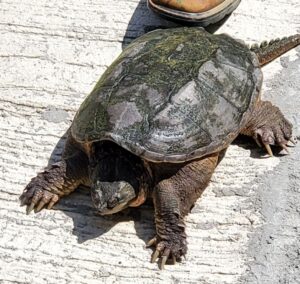
Red-Eared Slider
We routinely receive calls concerning turtles in and around ponds – are turtles harmful? Turtle sightings are most common during the spring as they emerge from their winter hideouts. Several species of aquatic turtles are found in north Texas. Red-eared sliders are by far the most common species and are a healthy component of a pond’s ecosystem. Red-eared sliders are too slow to catch a healthy fish; however, they remove diseased or injured fish and help clean up any natural fish kills that may occur. Their primary diet consists of aquatic vegetation and decaying organic material. On sunny days, you will often see red-eared sliders hanging out in large groups along the shoreline or lounging on partially submerged logs.
On the other hand, snapping turtles and softshell turtles are piscivorous (fish eating) and can potentially impact gamefish populations. They grow to large sizes and should be removed if quality fishing is top priority. Snapping turtles are notorious for snagging young ducklings from the water surface. Fortunately, snapping turtles are rarely found in community ponds. They are more likely to be found in ponds that are directly connected to creeks or streams.

Common Snapping Turtle
All species of aquatic turtles can be a nuisance to fishermen when using natural bait. In fact, they are often the first thing to take the hook. There are various commercial turtle traps available on the market; however, humane removal requires that the traps be checked on a daily basis. Otherwise, the turtles will quickly drown. Trapping turtles in public water is illegal in Texas; therefore, it is important to first identify the ownership status of the pond. Keeping wild caught turtles for pets or commercial use requires a non-game permit from the state of Texas (TPWD). Trapping turtles in private water still necessitates safe relocation into the wild.
You may occasionally see a few dead turtles around a pond. This is often the result of fishermen cutting their lines and leaving the hook in the mouth or throat. However, species-specific turtle viruses are becoming more common in community ponds. Ranavirus affects turtles and amphibians and can cause widespread die offs of red-eared sliders. Texas Parks and Wildlife Department protocols advise not to touch or pick up the carcasses; as this can potentially cause the disease to spread. It should be noted that this virus poses no threat to people nor pets.
